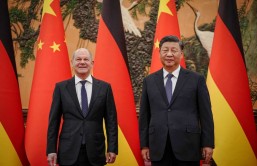New York City is owed over $16 million in unpaid parking tickets issued to foreign diplomatic officials from more than 180 countries, bringing attention to the glaring challenge of collecting on violations more than a decade old, the Associated Press reported.
Egypt tops the list with nearly $2 million in outstanding debt as of this summer, according to the city's Department of Finance. Five other countries owe more than $500,000: Nigeria, Indonesia, Brazil, Morocco and Pakistan.
"The vast majority of the debt - $15.6 million - is from tickets issued to diplomatic vehicles before 2002, when Mayor Michael Bloomberg's administration embarked on a mission to combat widespread parking violations," Wall Street Journal reported. "That effort drastically reduced the amount of unpaid parking tickets since, but the city has made little progress collecting on older violations."
Since a laissez-faire policy largely allowed diplomats and consular officials to ignore the tickets without penalty for decades, the city has continuously struggled to collect money from the diplomatic community, who are issued special license plates from the U.S. Department of State.
For example, from April 1997 to November 2002, members of the diplomatic community accrued roughly $23 million in unpaid summonses.
In 2002, the Bloomberg administration demanded the State Department to surrender the license plates of certain diplomatic ticket scofflaws or decline the renewal of their registration. Since then, the outstanding debt from tickets is about $743,000, compared with $15.6 million before the city's enforcement program, city officials said.
As world leaders descended on Manhattan for the United Nations General Assembly this week, consular and mission officials reacted with a mixture of chagrin and annoyance when asked about unpaid parking tickets, according to WSJ.
"I don't have details about the subject, unfortunately," Ahmed Sharaf, a spokesman for Egypt's U.N. mission, said.
Asked about Nigeria's $894,000 in unpaid tickets, Tope Ade Elias-Fatile, who is listed as a senior counselor and head of media at the country's mission to the U.N., said, "I don't know why I should be the one to talk."
João Francisco Pereira, a spokesman for the Mission of Brazil to the U.N., said officials have requested the city provide "detailed information concerning this issue." That request, he said, is "still being processed."
Officials from Indonesia, Morocco and Pakistan declined to comment, according to WSJ.
Meanwhile, Ivan Tarazona, a 36-year-old doorman at a residential building in Manhattan's Turtle Bay neighborhood near the U.N., said vehicles with diplomatic plates regularly flout the law.
"There's a bike lane right in front of our building, and you'll see four cars of theirs parked out here, in a row," he said. "You're obviously not supposed to park here, but he's got the blue plate, what're you going to do?"








